
Background observations by a European author living in Asia on the current escalation with China
After the megaphones of the West have already called for all-out economic war against Russia, the battle cry against China is now being heard, regardless of the consequences for the “common people.” The reaction of the Asian countries, however, is likely to disappoint the vociferous, self-righteous screaming sharks.
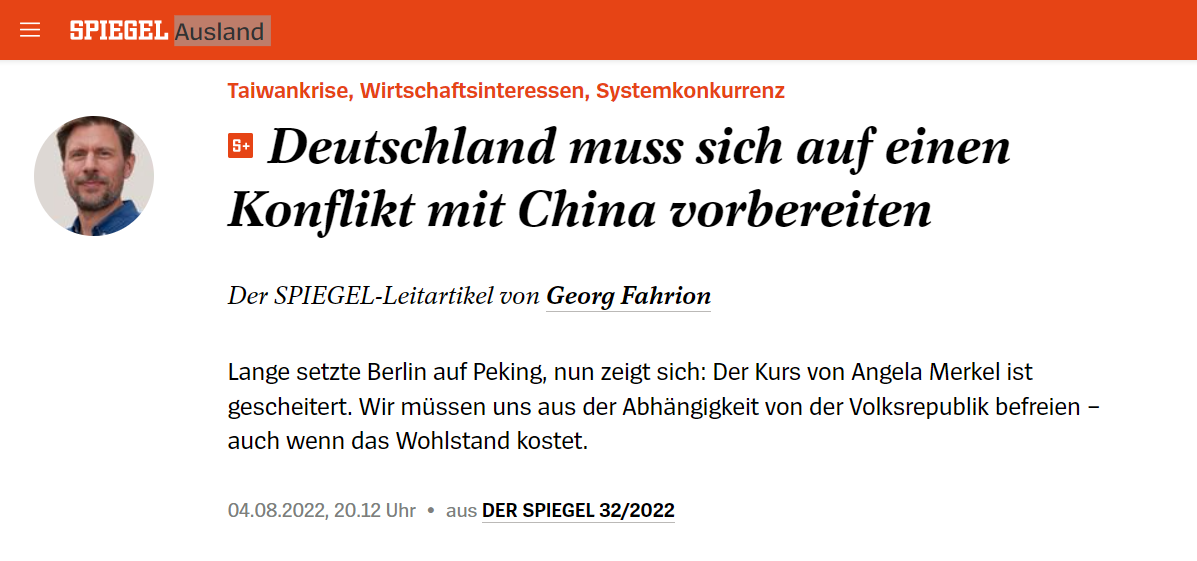

Der Spiegel calls itself the leading German news magazine. Indeed, it is an opinion leader in much of Europe and decades ago was known for its independence and criticism of the U.S. and its dutiful ally, the German government. Those days are long gone. Now it is at the forefront of the propaganda war against Russia, shamelessly spreading brazen lies, as in the days of its duplicitous star journalist Claas Relotius.
It is now also blowing the trumpet for an attack on China, which is being portrayed as a fire hazard. This time it is being posited as a much greater threat to democracy than the Taliban in the Hindu Kush—oops, where was that again?—where NATO troops, including German soldiers, were, according to leading German politicians at the time, supposedly defending German freedom. China is, further, being depicted as more of a threat than the extremely dangerous Russians in oh-so-democratic Ukraine. And, of course, numerous German and other European media, as well as politicians, feel compelled to espouse the same line.




The above examples show how politicians and the media in Europe are stirring up the mood and conjuring up the red or yellow peril once again.
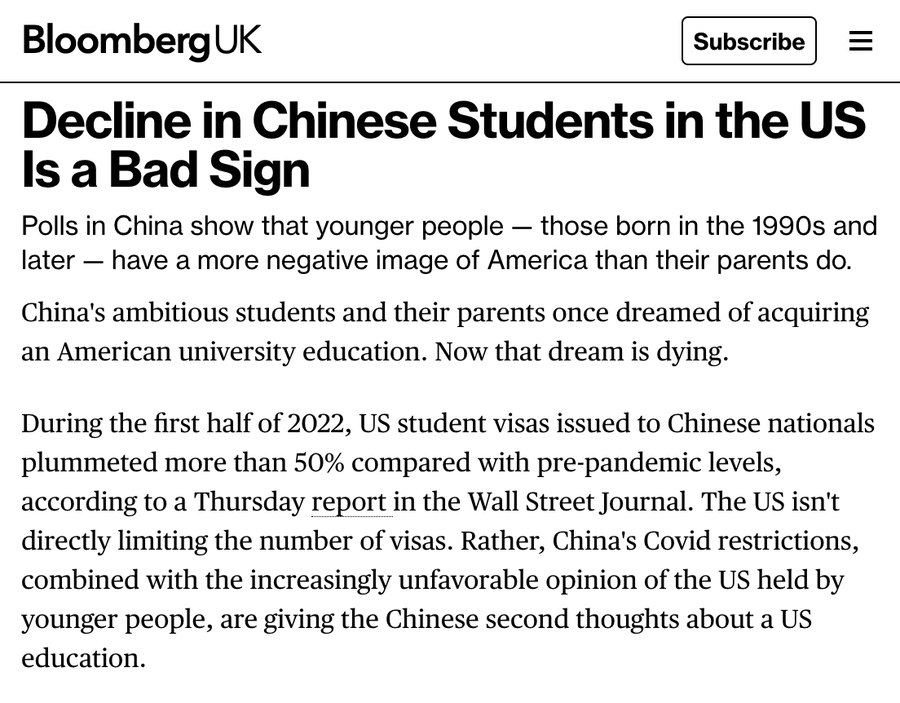
Spiegel reporter, Georg Fahrion, who lives in China, is particularly diligent in warning about the sinister danger coming from China. He hardly leaves a good hair on the country’s head and spits into the Chinese noodle soup whenever he can. He is not particularly original in doing so, because most Western journalists who deal with China and, incidentally, do not speak Chinese, do more or less the same thing, as if they had colluded together.

What he has in common with many of his German colleagues is that he has never had to sell anything: no cars, no machines and no “Adidas” shoes, and certainly not in China, where German products are bought by millions of customers and secure hundreds of thousands of German jobs.
And certainly Fahrion and his comrades in the editorial offices, which have become intellectual shooting galleries, have never had to buy components from China that help keep the German economy competitive. Or procure consumer goods that are produced cheaply in China and without which the purchasing power and prosperity of German consumers would be a lot more modest.
Well-paid do-gooders
The famous German auto industry, for example, currently sells 40% of its cars in China. Whether the “America First” ally would help out and buy many more German cars in the event of a sales slump, provoked or forced by German politicians and their media partners, is doubtful.
German entrepreneurs know it, but not from Der Spiegel and other anti-Russia media: Access to Russian raw materials, which is denied to them by sanctimonious ideologues in politics and the media, is a real threat to the survival of their businesses. The well-paid do-gooders have already ruined their Russian sales market. Conveniently, they do not suffer the consequences of their policies, but German enterprises and ordinary people do: Germans as well as other Europeans are now suffering rapidly increasing job losses, price increases, and fuel shortages as a result of their governments’ economic war, in line with Washington’s stance against Russia, which has been enthusiastically supported by the European mainstream media.
If the media once again succeed in stirring up the politicians, so that their China business also goes down the drain, then poverty in Germany could spread in the blink of an eye. While the masses then suffer, the aloof political and journalistic elites can at least bask in their moral superiority.
The inglorious end of an industry leader
Here’s a taste of what could be in store for Germany’s once-proud industry: Germany’s Bosch, a leading global manufacturer of auto parts, power tools and household appliances, has 38 production facilities in China. The company also operates two factories in Russia.
The German government is investigating possible violations by Bosch of an export ban to Russia. The German company said it had not supplied Bosch components allegedly found in Russian military vehicles to the Russian vehicle manufacturer. It added that local contracts with automotive customers stipulated that the products could only be used for civilian applications. After initially massively curtailing its Russian business following an accusation by Ukraine’s foreign minister, Europe’s largest appliance maker is now looking for a buyer for its Russian factories. Chinese and Turkish suppliers of “white goods” have expressed interest and are the most likely buyers to take Bosch’s place in Russia.
If German politicians and media have their way, Bosch’s fate in Russia will be repeated in China. And what happens to an industrial giant like Bosch, which has to lose markets and shrink sharply, can happen to any other German company.
Lady Gaga—the great role model for the Chinese longing for “freedom”?
According to The Times of London, the singer Lady Gaga embodies everything China is afraid of.
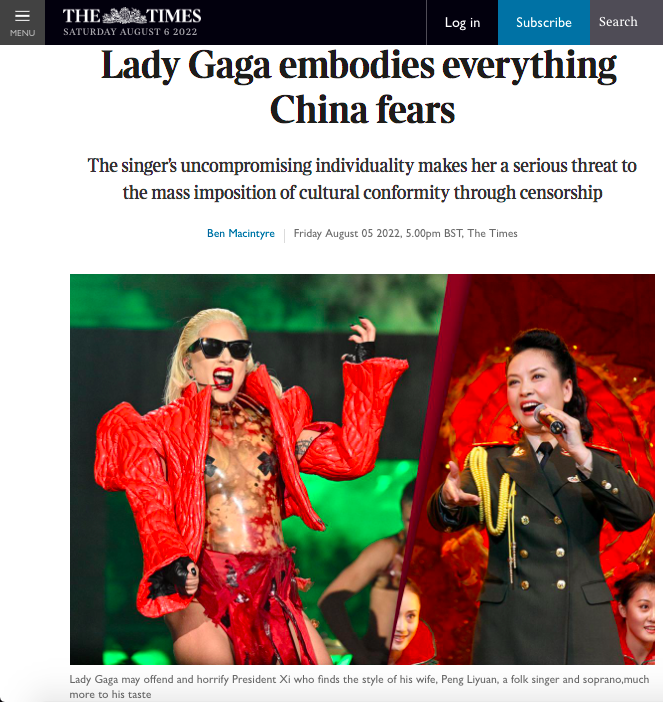
At a festival sponsored by Lady Gaga, there was an “Artpop” moment in which a “vomit artist” vomited on the singer.
“For us, that performance was art in its purest form. But we completely understand that some people don’t like it,” Gaga explained.
This probably includes more than a billion Chinese who don’t think much of American vomit art and see no reason to emulate this artist. Of course, foreign music is listened to in China, such as K-Pop or the music of Taylor Swift, Ed Sheeran, Shawn Mendes, Drake, Coldplay and Passenger, but mostly by younger people. There’s even a TV show called “中国有嘻哈,” which literally means “China has hip-hop.” Of course, you don’t hear about it in the Western media, which prefers to denigrate China.
Trending videos about street fashion in China on “Douyin,” the Chinese version of TikTok, contradict Western media propaganda, which portrays the country as rather drab, colorless and a “collectivist dictatorship.”
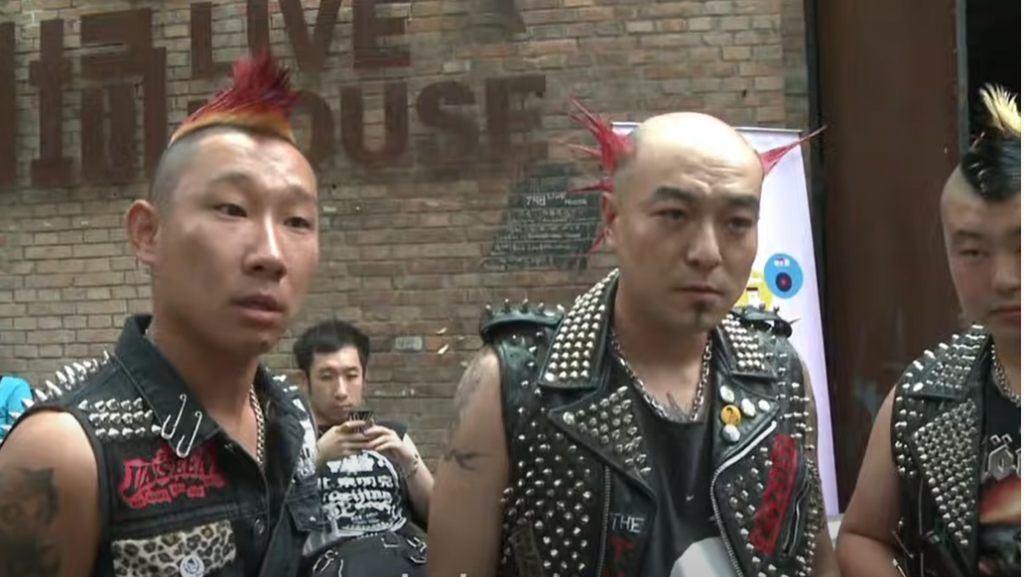
Anyone who wants to learn more about China, and not through the obfuscating Western lens, can do so, for example, on this portal run by expats in Hong Kong, China.
Journalists, but also politicians who want to be in the media spotlight, hardly miss an opportunity for sensational China-bashing these days. From the alleged cruel fate of a Chinese tennis star to the fabricated genocide in China’s Xinjiang to Taiwan, which is supposedly going to be militarily attacked by China. Objectively, this makes no sense at all, as the microchip-based economy and daily life of the world, including China, could come to a complete standstill: Chips from Taiwan are in smart phones, air conditioners, smart doorbells, computers and other electronic devices, cars, F-35 fighter jets and so on. Currently, Taiwan’s TMSC produces 92% of the world’s most advanced chips.
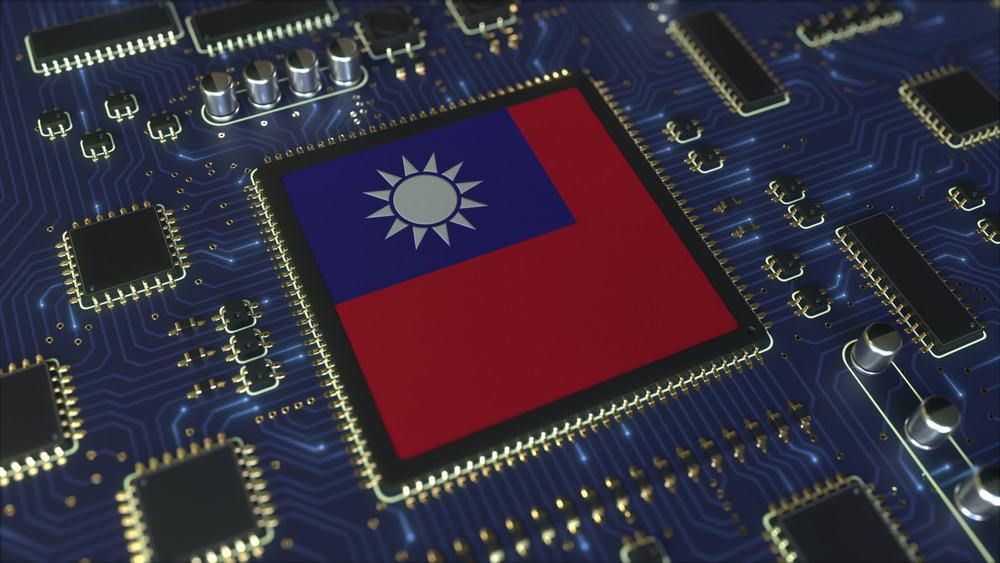
However, in the interest of U.S. policy to weaken both China and Russia, they are demanding isolation as a precautionary “punishment” of China in anticipatory obedience.
Asian countries refuse to be abused as “useful idiots” of the American Empire at their own expense
Isolating China, as demanded by American, European and other Western politicians, academics and journalists, would go too far even for die-hard secessionists in Taiwan. The island’s economy is strongly intertwined with the mainland’s, and trade exchange with China is much more intensive than with the United States. An import and export freeze directed against China would plunge Taiwan into a deep economic crisis.
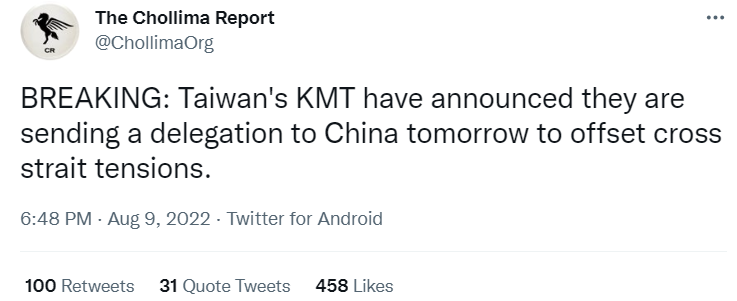
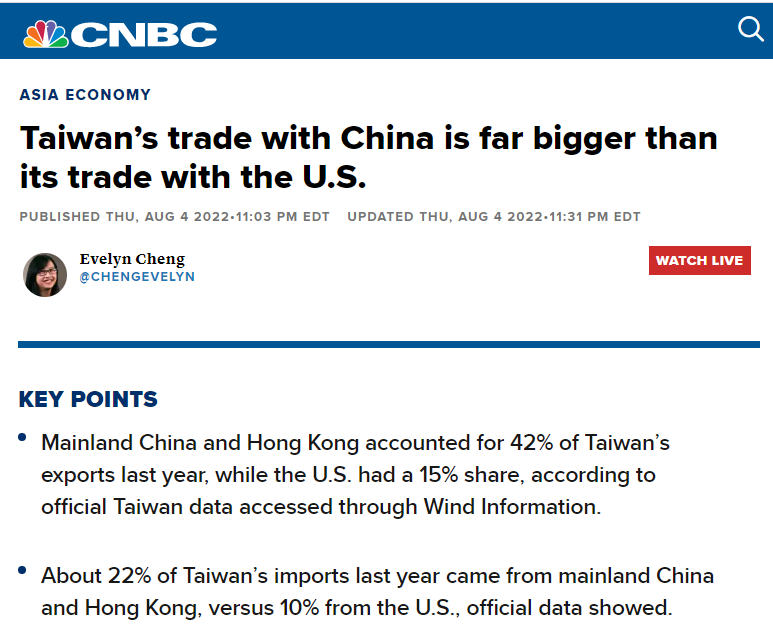
Even conservative South Korean President Yoon, a staunch U.S. supporter, avoided a meeting with U.S. Speaker Pelosi after her provocative Taiwan trip. Too much is at stake for his country, which has exports worth more than $132 billion to China compared to $74 billion to the United States.
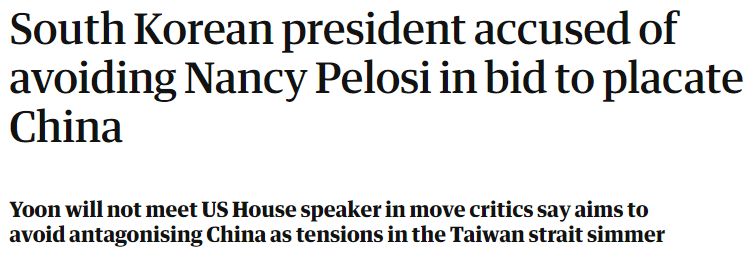
Close U.S. ally Japan, whose exports to China significantly exceed those to the United States, also shows no enthusiasm for U.S.-initiated economic isolation of such an important trading partner and the increased tensions that would result. Last year, Japan’s defense white paper called for “crisis awareness” regarding Taiwan: “Stabilizing the situation around Taiwan is important for Japan’s security and the stability of the international community.”
Despite the border dispute between India and China, India’s foreign minister recently stressed that “there can be no Asian century if India and China don’t join hands.” Beijing agreed, adding that “China and India have far more common interests than differences and the two neighbors have the wisdom and capability to reinforce each other better than pose a threat to each other.” India has resisted pressure from the West to take sides against Russia in the Ukraine conflict and is determined not to let the West use it as a battering ram against China. The Indian media report that “Indian companies are swapping the US dollar for Asian currencies,” adding that one “Top Indian firm pays for Russian coal in yuan and traders say more buyers could turn to China’s currency.”
This will be a major headache for the hawks of the U.S. empire in Washington, and their European lackeys will not be able to do anything about it either.
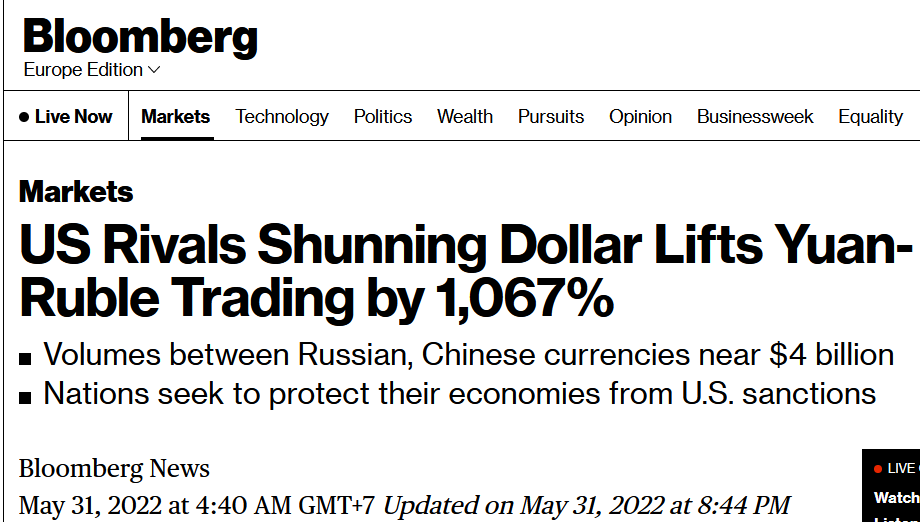
ASEAN, the Association of Southeast Asian Nations (Brunei, Cambodia, Indonesia, Laos, Malaysia, Myanmar, Philippines, Singapore, Thailand, and Vietnam), called for “calm in the Taiwan Strait” after U.S. House of Representatives Speaker Nancy Pelosi’s provocative visit to Taipei, fearing further “provocative” actions.
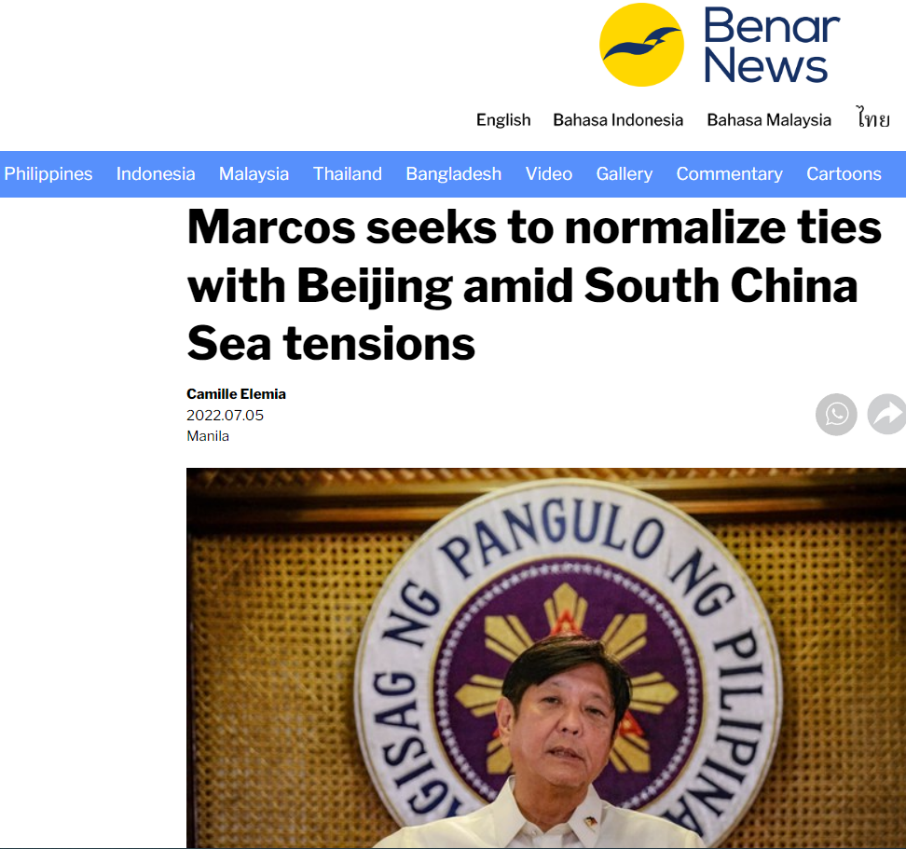
Despite the fact that the Philippines has long been kept dependent on the United States, its President Ferdinand Marcos, Jr., like his predecessors, is seeking to maintain his loyalty to Washington while trying to keep China as a close partner. In his first Cabinet meeting, President Marcos Jr. said his new government would “strengthen ties with Beijing, including through military exchanges,” amid ongoing tensions in the South China Sea over Chinese vessels in waters claimed by the Philippines.
Under pressure from Washington, Indonesia agreed to hold joint combat exercises on its island of Sumatra amid America’s so-called “China concerns.” But Indonesia, which is hosting this year’s G-20 summit, also invited the leaders of China and Russia to the event, despite opposition from NATO member states.
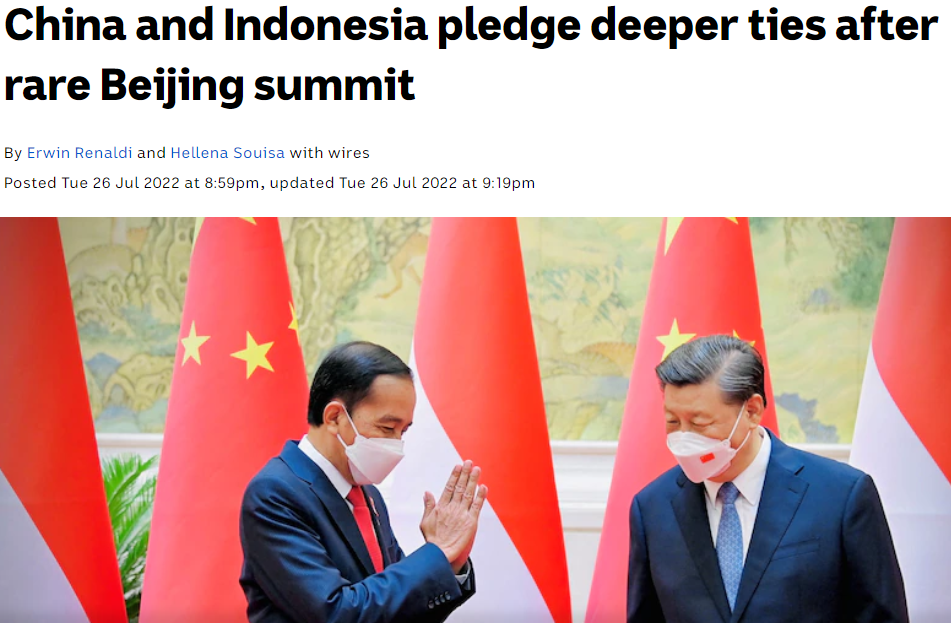
More importantly, at a meeting in Beijing just weeks before the G-20 meeting, the leaders of China and Indonesia pledged to “increase bilateral trade and expand cooperation in areas such as agriculture and food security.”
There is significant discord between Vietnam and China, particularly over border demarcation in the South China Sea, which the Vietnamese refer to as the East Sea. However, Vietnam seeks to expand rather than restrict trade with China, in order to increase economic growth and the prosperity of its own people.
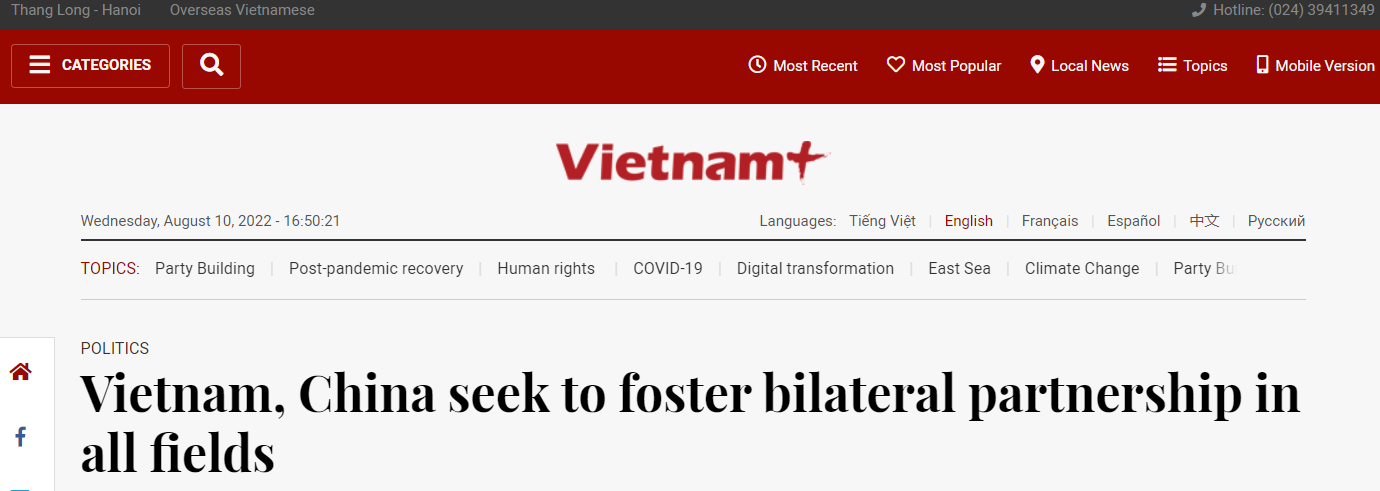
When U.S. Vice President Kamala Harris visited Singapore and Vietnam in August 2021 and tried to persuade these two countries to ally with America against China, she met with little sympathy. This is because these Southeast Asian nations wish to maintain good relations with all countries and not be manipulated as “useful idiots” of the American Empire. They see the detriment to European countries of adopting this position and are keen to avoid it.
Shortly before her arrival in Hanoi, the Vietnamese prime minister met with the Chinese ambassador to assure China that his country would stay out of any great power rivalries.
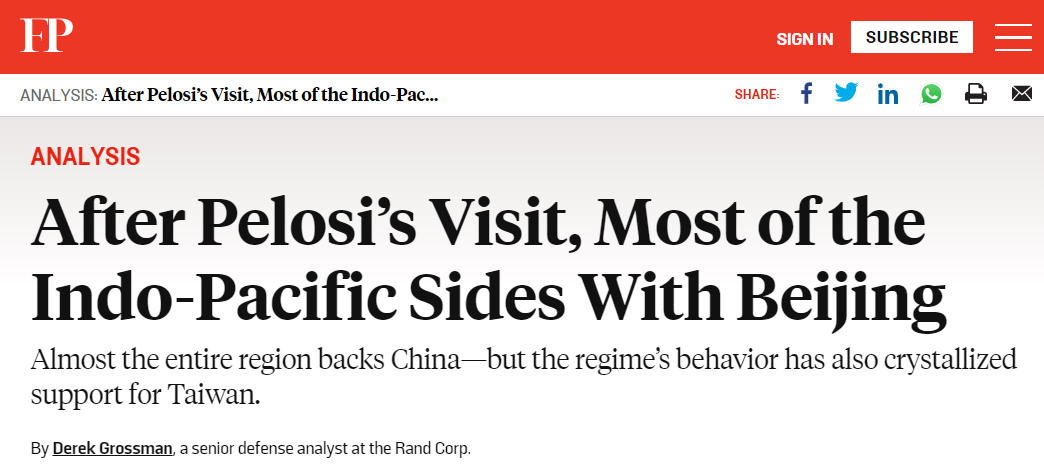
Even a senior “analyst” from the neo-conservative Rand Corporation think tank, which is funded primarily by the U.S. government and the all-powerful war industry and which sets policy and helps send Americans to war, grudgingly admitted that most of Asia is on the side of China, not the United States. It is striking that a similar “analysis” admitting this inconvenient fact has not been published by the European mainstream media.
Kept in ignorance by the media
Der Spiegel and the many like-minded European media naturally do not make this a topic of discussion. As with the Ukraine conflict, in China, too, the prehistory and background are systematically blanked out and those who dare to shed light on it are defamed. This is being repeated in the new conflict with China over Taiwan, conjured up by the United States, where crucial facts are again being censored:
This includes, for example, the fact that China treats the island of Formosa/Taiwan, which was brought under mainland control by the Manchurian-founded Qing Dynasty in 1682, with much more respect than the bellicose U.S. treats Cuba.
China trades heavily with Taiwan, and Taiwanese operate numerous factories in mainland China. In contrast, the U.S. has imposed a brutal economic boycott on Cuba for decades, which other countries around the world have been obliged to follow. Not even aid money may be transferred to Cuba, which in the case of Taiwan is possible at any time. While Taiwan historically belongs to China, Cuba has never been a “province” or a state of the United States, except for the time when the island was, de facto, under the control of the American mafia, which abused it as a giant brothel until the revolution under Fidel Castro in 1959.
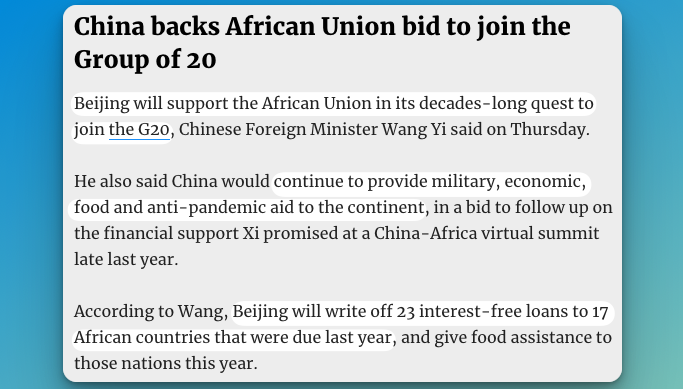
Now America is massively increasing its arms sales to Taiwan’s regime. Imagine China arming Cuba in the same way: The Americans would immediately declare war on the Chinese because of their Monroe Doctrine. And should Chinese aircraft carriers constantly cruise between Florida and Cuba, like the U.S. Navy near Taiwan and mainland China, the U.S. would most likely not hesitate to attack them.

The fact that the developments outlined above are concealed in the European media is not new. Even in the Ukraine conflict, for example, it was not pointed out that the U.S. has been pursuing the strategy of preventing a functioning Russia-EU economic area for decades. For example, strategists in Washington feared the enormous synergies between Russia’s vast reserves of raw materials and Germany’s outstanding technology, just as they feared a united Korea with a north rich in raw materials and a technologically strong south.
The so-called economic miracle of the now-weakened Germany, which had become an annoyance to its American rival thanks to cheap Russian raw materials, is now finally coming to an end. Washington can rightly celebrate this as a fine success of its policy.
Similarly, for seven decades, the U.S. successfully ensured that the Korean War armistice remained in effect rather than signing a peace treaty that would have been an important step toward Korean reunification. New economic power centers in Europe and on the Korean Peninsula that would have emerged without Washington’s interference are seen as major threats to U.S. hegemony, and Washington will continue to do everything it can to prevent this.
Nor did the media mention the well-known U.S. strategy papers for destabilizing Russia. Or the declared intention of the U.S. to maintain its role as a “world order power” at any cost and to secure the dollar as the world currency, which it uses as a weapon against countries that resist the will of the self-serving empire. The interests and pervading influence of the gigantic Western arms industries and their stockholders were not analyzed and questioned either.
Instead, they have preferred to castigate the war propaganda of one side (Russia) in the Ukraine conflict and uncritically adopt and disseminate that of the other side (Kyiv). This includes the vehemently refuted accusations that Russian soldiers are raping Ukrainian babies or that Russian troops are shelling civilian buildings, without mentioning that Ukraine is systematically abusing civilians, utilizing them as human shields.

Also not worth mentioning is the fact that China was egregiously humiliated by foreign powers for a hundred years, characterized by pandemics, famines, corruption, mass murder and widespread drug addiction. The opium wars against China helped the British improve their balance of trade by sourcing opium from their Indian colony and selling it at great profit in China. As a result, by the end of the 19th century, about 10% of China’s population was addicted to opium, and a significant portion of the country’s silver and other assets flowed out of the country to pay for the drug. Many of the economic problems China later faced were attributed either directly or indirectly to the opium trade.
From the late 19th century to the first half of the 20th century, the U.S. and other foreign powers used gunboats on Chinese rivers to harass and subjugate China. Now America is bullying China again, principally with coercive economic measures, but the Chinese want their country to be strong enough this time to prevent new humiliations. The attempt by the Americans and their Western allies to turn the 21st century into a new “century of humiliation for China” is therefore likely to be much more difficult than last time.
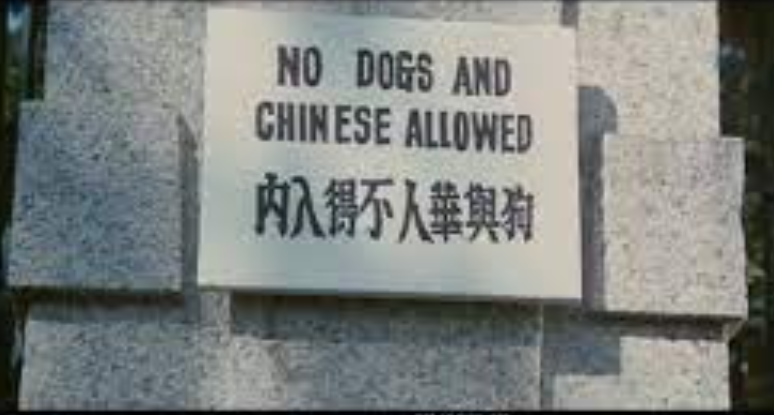
An easy game for a dominant superpower to eliminate competitors
As long as America benefits from free markets and competition, it will respect them and play by the rules. When competitors emerge that are better than American companies, they are subjected to coercive measures such as sanctions. For example, the U.S. forced chipmakers and other suppliers around the world to stop supplying the leading Chinese high-tech company, Huawei, in order to destroy it.
Under the pretext that a genocide of Muslims is taking place in China’s Xinjiang province where they are also allegedly being coerced into forced labor, the U.S. Congress passed a law to boycott cotton produced there which is cheaper and better than the American product.
Absurdly, 90% of the cotton in Xinjiang is picked and processed not by humans but by machines, many of them American John Deere machines. This company is now also forbidden to sell its machines to the cotton farms, whose owners are mostly Muslim Uyghurs.

According to an August 1992 Los Angeles Times article, Toshiba was Japan’s leading chipmaker in the 1980s, with a market share of about 80% in dynamic random access memory (DRAM) products in 1987. Like Huawei, Toshiba was targeted by the United States because of “national security concerns.”
After Toshiba and a Norwegian company sold sophisticated milling machines to the Soviet Union in 1986, as did manufacturers from other Western European countries, Washington struck, imposing a two- to five-year ban on all Toshiba Corporation products on the grounds that sales to the Soviet Union posed a threat to U.S. national security. With this crushing blow, the U.S. was able to rid itself of a superior competitor and clear the way for its own chip manufacturers. The companies of other countries, which also sold milling machines to the Soviet Union, were left unmolested.

Alstom was once called the “French industrial jewel” because the company was a world leader in various fields of energy and transport technology. The company had built power plants, power transmission systems and railroads. When the company became a serious competitor to U.S. giant General Electric (GE) in many countries in the early 2010s, Washington took aim.
The American government struck when it claimed to know that Frédéric Pierucci, an Alstom executive and author of the book The American Trap: My Battle to Expose America’s Secret Economic War Against the Rest of the World, had approved bribes to Indonesian officials to secure a business contract. He was arrested by police at a New York airport in 2013. Pierucci wrote in his book that his lawyer was offered an extortionist deal: He could plead guilty and be free within months or “risk up to 125 years in prison.”
Several other high-ranking Alstom managers were also arrested in the United States in the course of these bribery allegations. The company was fined a hefty $772 million by U.S. judges in the bribery case. The sword of Damocles—additional “penalties”—continued to hover over the company. In 2014, Alstom had no choice but to reach an agreement with General Electric to sell its energy and grid divisions, the Alstom Group’s cornerstones. By breaking up this global industrial giant, America has eliminated another major competitor.
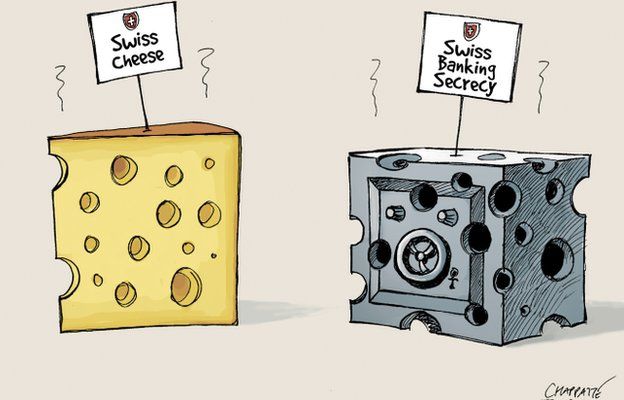
In Switzerland, banking secrecy with anonymous numbered accounts was abolished a few years ago—due to massive pressure from the United States, a fact that is still unknown to most people and not taken into account by those who publish rankings of money laundering and tax evasion havens.
Washington, however, allowed American states to set up shell companies where the beneficial owners do not have to be disclosed; they remain as anonymous as in the numbered accounts abolished in Switzerland at the instigation of the U.S. This, too, is unknown to most people.
In doing so, the U.S. eliminated a major competitor, adopted its lucrative business model, and also became by far the largest money-laundering machine in the world. Previously, offshore financial centers around the world were rocked by scandals based on stolen client files, mainly from Switzerland, but also from Panama, Singapore and almost all small Caribbean and Pacific islands.
But, from the U.S., where the most taxes are evaded and dirty money is laundered like nowhere else, there has been no leak or revelation. Is this a coincidence? No, it is not the job of the National Security Agency (NSA) and other U.S. government agencies to monitor and harm American banks, only their foreign competitors.
Nor can the British government, known as America’s “loyal poodle” or the “Five Eyes” (a major part of the united Deep State of Anglo-Saxon countries led by Washington that collectively spies on German chancellors, French presidents, Austrian and other European authorities, you, me, and the rest of the world’s population), be expected to share dirty information about its vast money-laundering machine in the British Isles and especially in the City of London, which the Financial Times calls the “capital of dirty money.”
Destroying unwelcome competitors, taking over their allegedly illegal and cursed businesses and even massively expanding them is thus common practice in the best of all Americas. And the rest of the value West tolerates it.

After successfully provoking the Bear, it is time to inflame the Panda
Taiwanese rapper and activist Zhong Xiangyu debunks a myth perpetuated by Washington’s European media partners: “The U.S. government has never been a protector of Taiwan, it does not care about the people of Taiwan. The United States isn’t our friend. It’s the friend of certain beneficiaries in the elites of some special regimes.”
The U.S. Navy was the first country to attack Taiwan with a warship in 1867. The U.S. Navy supported Japan in invading Taiwan in 1874. The U.S. government sold weapons to Japan during the Sino-Japanese War, leading to China’s defeat and forcing China to cede Taiwan to Japan in 1895. Today Taiwan separatism is not true independence. It just means serving U.S. interests in a hegemonic, unequal relationship.”
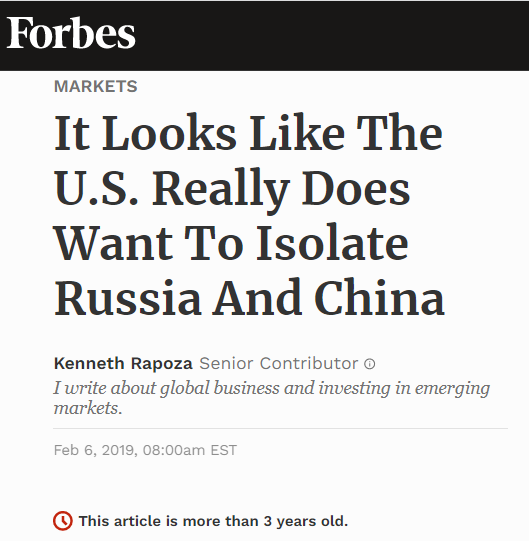
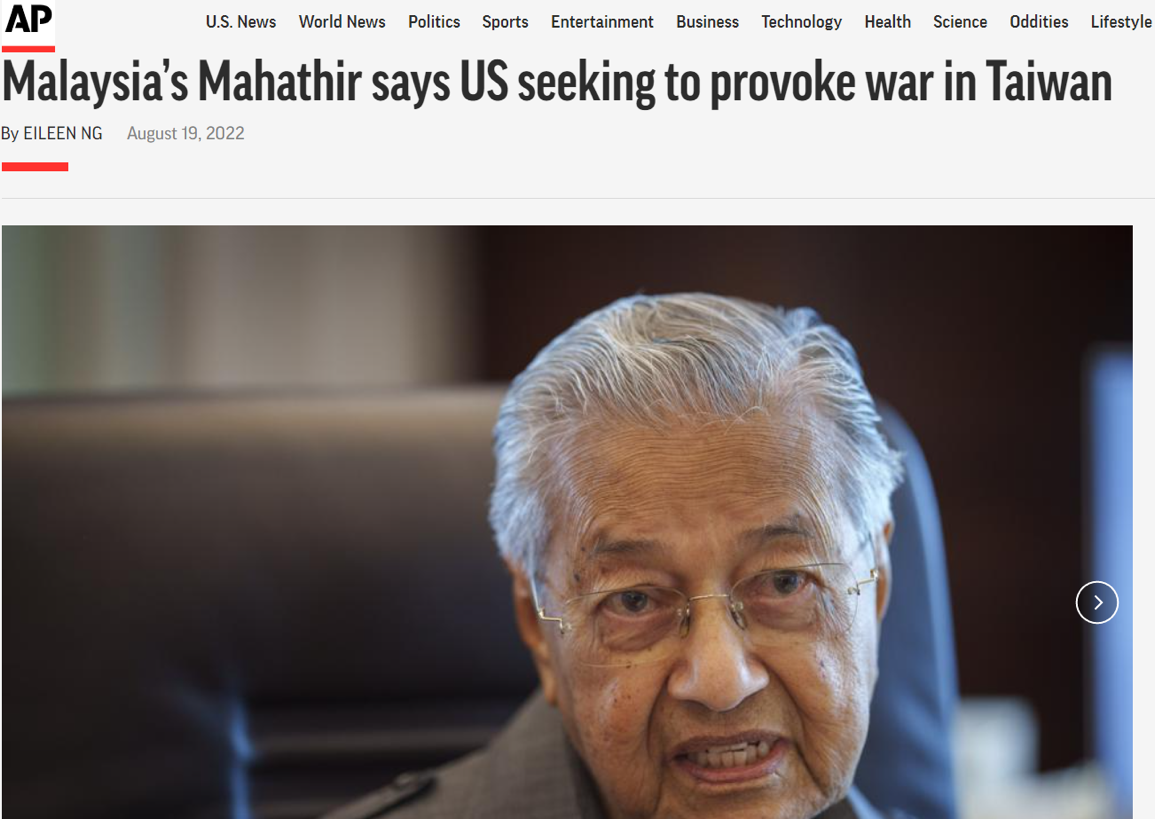
The U.S. provoked Russia by trampling on its security interests until Moscow fell into a Washington-set trap à la Afghanistan. By illegally invading Ukraine, Moscow gave the U.S. and its European and other supporters a reason to implement Washington’s plan to isolate Russia economically from much of the world and intensify a proxy war that began not in February 2022 but after the U.S.-initiated regime change in Kyiv in 2014.
Can Washington succeed again with a similarly provocative approach in China’s case regarding Taiwan? Perhaps. Dr. Mahathir, Malaysia’s former long-time prime minister, states: “China has allowed Taiwan to remain by itself. No problem. They didn’t invade. If they wanted to invade, they could have invaded. They didn’t. But America is provoking [them] so that there can be a war, so that the Chinese will make the mistake of trying to occupy Taiwan.”
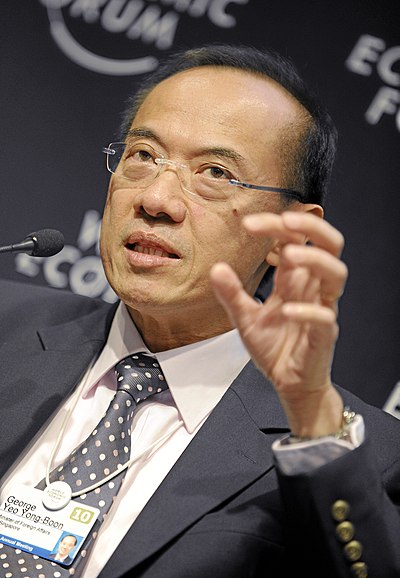
And George Yeo, former foreign minister of Singapore, minces no diplomatic words, saying: “Poking the panda [and] constant provocation by the U.S. will lead to ‘a bomb which will explode in our faces.’”
To force foreign companies to stop investing in and dealing with China, the U.S. Empire needs political-military conflicts with China. Its tactic is to stage crises from Hong Kong to Xinjiang to Taiwan. This allows Washington and its European and other minions to impose even more “sanctions” on China and on those trading with it.
In addition, the massive deployment of U.S. forces throughout the South China Sea and in close proximity to China, and the associated exacerbated risk of military confrontations, makes trade routes much less secure, which is part of Washington’s strategy to deter trading partners from China.
See the big picture?
Well, those who consume German, Swiss, Austrian and other European media will probably not succeed in seeing the whole picture. Especially not if you are supposed to do it by candlelight.

Perhaps here in Asia, where I have lived, done business and traveled for many years, Bertolt Brecht’s quote “First comes food, then comes morality” is not familiar, but what the famous German writer and director meant is a banal reality in this part of the world.
Unlike the wealth-addled, jaded politicians and journalists who are engaged in the economic sellout of Europe, no one here is asking the population to sacrifice its prosperity in the name of a mendacious morality that hides the tangible economic interests of an aging but still very aggressive Western empire.

CovertAction Magazine is made possible by subscriptions, orders and donations from readers like you.
Blow the Whistle on U.S. Imperialism
Click the whistle and donate
When you donate to CovertAction Magazine, you are supporting investigative journalism. Your contributions go directly to supporting the development, production, editing, and dissemination of the Magazine.
CovertAction Magazine does not receive corporate or government sponsorship. Yet, we hold a steadfast commitment to providing compensation for writers, editorial and technical support. Your support helps facilitate this compensation as well as increase the caliber of this work.
Please make a donation by clicking on the donate logo above and enter the amount and your credit or debit card information.
CovertAction Institute, Inc. (CAI) is a 501(c)(3) non-profit organization and your gift is tax-deductible for federal income purposes. CAI’s tax-exempt ID number is 87-2461683.
We sincerely thank you for your support.
Disclaimer: The contents of this article are the sole responsibility of the author(s). CovertAction Institute, Inc. (CAI), including its Board of Directors (BD), Editorial Board (EB), Advisory Board (AB), staff, volunteers and its projects (including CovertAction Magazine) are not responsible for any inaccurate or incorrect statement in this article. This article also does not necessarily represent the views the BD, the EB, the AB, staff, volunteers, or any members of its projects.
Differing viewpoints: CAM publishes articles with differing viewpoints in an effort to nurture vibrant debate and thoughtful critical analysis. Feel free to comment on the articles in the comment section and/or send your letters to the Editors, which we will publish in the Letters column.
Copyrighted Material: This web site may contain copyrighted material the use of which has not always been specifically authorized by the copyright owner. As a not-for-profit charitable organization incorporated in the State of New York, we are making such material available in an effort to advance the understanding of humanity’s problems and hopefully to help find solutions for those problems. We believe this constitutes a ‘fair use’ of any such copyrighted material as provided for in section 107 of the US Copyright Law. You can read more about ‘fair use’ and US Copyright Law at the Legal Information Institute of Cornell Law School.
Republishing: CovertAction Magazine (CAM) grants permission to cross-post CAM articles on not-for-profit community internet sites as long as the source is acknowledged together with a hyperlink to the original CovertAction Magazine article. Also, kindly let us know at info@CovertActionMagazine.com. For publication of CAM articles in print or other forms including commercial internet sites, contact: info@CovertActionMagazine.com.
By using this site, you agree to these terms above.
About the Author
Felix Abt is the author of “A Capitalist in North Korea: My Seven Years in the Hermit Kingdom” and of “A Land of Prison Camps, Starving Slaves and Nuclear Bombs?”
He can be reached via his Twitter account.

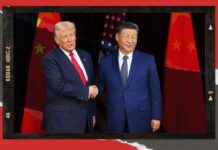

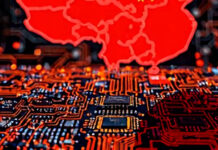


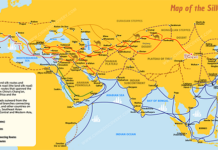
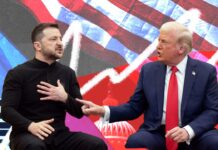
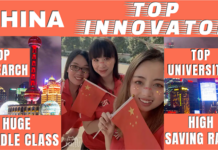
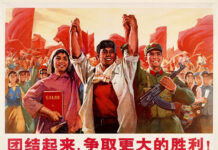

[…] 与看似完全脱节的西方媒体相比,对中国的了解要好得多的东亚媒体在胡锦涛送出党代会时使用了不那么紧张的语言。在这种情况下,同样重要的是要注意,与欧洲不同,亚洲国家不想被卷入美国以牺牲自己的利益来对抗中国,正如我在这里详述的那样。 […]
[…] Novináři, ale i politici, kteří chtějí být v centru pozornosti médií, si v těchto dnech jen stěží nechají ujít příležitost ke kopnutí si do Číny. Od údajného krutého osudu čínské tenisové hvězdy po vykonstruovanou genocidu v čínském Sin-ťiangu až po Tchaj-wan, který se prý chystá vojensky napadnout Čína. Objektivně to nedává vůbec žádný smysl, protože ekonomika založená na mikročipech a každodenní život světa, včetně Číny, by se mohly úplně zastavit: čipy z Tchaj-wanu jsou v chytrých telefonech, klimatizacích, chytrých zvoncích, počítačích, zařízení auta, stíhačky F-35 a tak dále. V současnosti tchajwanský TMSC vyrábí 92 % nejmodernějších čipů na světě . […]
[…] QUELLE: MOST OF ASIA IS ON THE SIDE OF CHINA AND NOT THE U.S. IN GROWING CONFLICT […]
There are only 2 possibilities: (1) they economically depend on China, because they didn’t see the trap and (2) they are as criminal as RuSSia, North Corea and China themselves. And the latter ones need to be crushed by any means necessary…
[…] Originalen til denne artikkelen ligger på Covert Action Magazine: Most of Asia is On the Side of China and Not the U.S. in Growing Conflict […]
I am making 80 US dollars per hr. to complete some internet services from home. I did not ever think it would even be achievable however my confidant mate got 13,500 us dollars in only four weeks easily doing this best assignment and also she convinced me to avail. Look extra details
going to this article… https://libertywealth.neocities.org/
An excellent takedown, Felix. I, already familiar with a multitude of evils perpetrated by my [US] government, was astonished at the sheer magnitude of additional revelations you’ve presented. Bravo!
[…] 18) Most of Asia is On the Side of China and Not the U.S. in Growing Conflict https://covertactionmagazine.com/2022/09/14/most-of-asia-is-on-the-side-of-china-and-not-the-u-s-in-… […]
[…] Article HERE […]
–
A staggering 69 million Chinese adults across Mainland China and Hong Kong – a number roughly equivalent to double the current Canadian population – are considering a move to Canada in the next couple of years.
That’s not to say all of them will move here. After all, as part of Canada’s immigration plans, the country intends to welcome only 1.2 million new immigrants over the next three years – or a little more than 400,000 per year during that period.
But the goal of a recent pilot study by the Hamazaki Wong Marketing Group, in partnership with RIWI and Vivintel (a research division within Vividata), wasn’t to measure the number of Chinese immigrants who will land in Canada, but rather to gauge their interest in doing so – and delve into the potential implications for business leaders and marketers.
The organizations conducted an online survey of 3,000 respondents over the age of 18 between March 26 and 29, using a random sample of internet users from Mainland China and Hong Kong, with results presented during an online presentation on July 8.
Among its main findings is that Canada is currently the second-most desirable country in the world for potential Chinese immigrants, with one in five people citing their interest in moving here over the next couple of years. That places Canada behind the U.S., where 137.7 million Chinese people would like to move, and ahead of the U.K. (52.5 million) and Australia (28.9 million).
“[Canada’s] international standing is something we as a country can capitalize on to augment our population base for growth and prosperity,” says Sonny Wong, president at Hamazaki Wong Marketing Group. “This pertains to an immigrant base, but contained within are business people [and] entrepreneurs who could help move the economy forward in creating businesses, jobs and trade opportunities with their entire network of business contacts in Greater China.”
I’ll take the one on the right.